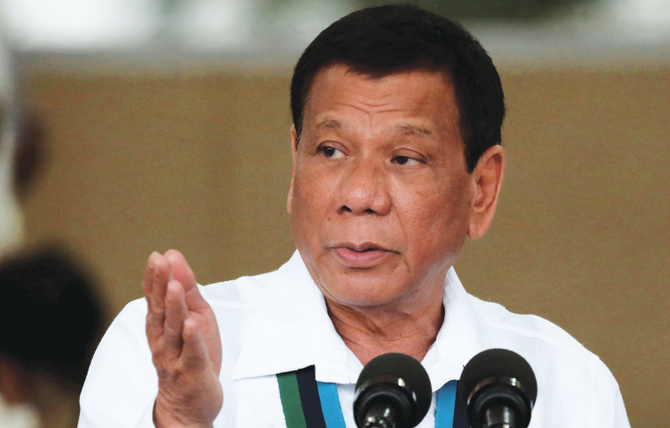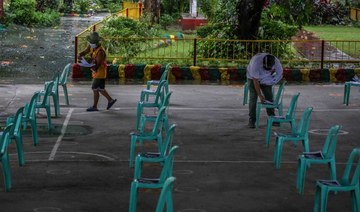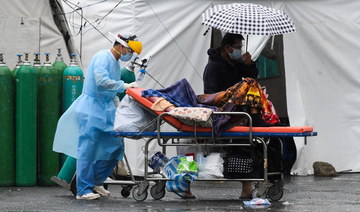MANILA: The Philippines said on Tuesday it will expand its COVID-19 vaccination program to include the general public and children aged 12-17 years old for the first time from October to achieve herd immunity and gradually return to normal life.
The Southeast Asian nation of 110 million people has reported one of the highest numbers of COVID-19 cases and deaths in Asia since the pandemic began last year, prompting authorities to impose strict anti-virus measures in the worst-affected areas and relax curbs in other parts to spur economic activity.
Still, vaccination measures have been slow, with only 20.3 million or 26 percent fully vaccinated and 23.6 million receiving their first dose since March when the government launched its vaccination drive for five priority groups, including health workers, senior citizens, those with comorbidities, economic frontliners, and indigents.
"The good news is, the president has approved the vaccination of the general population beginning October," President Rodrigo Duterte's spokesperson, Harry Roque, said in a press briefing.
"We will also start inoculating children (between 12 to 17 years of age) ...in October. This has also been approved by the president," he added, urging parents to register their children for the vaccination.
Malacañang's announcement comes a day after Duterte threatened to invoke police power of the state on those who refused to get vaccinated.
In a recorded address aired on Monday night, Duterte implored the public to get immunised, specifically Filipinos residing in areas with ample COVID-19 vaccine shots.
“Government has no power to compel any religion, faith, or church...We can only cooperate. But the police power of the state can be invoked if you pose a threat to others... (because) then you are already a danger to society,” he said.
Duterte further explained that once the Philippines had achieved herd immunity through mass immunization, it would be "safe to gradually ease restrictions."
“I now encourage you — those who have yet to receive the vaccines — to get inoculated...We are almost pleading down on our knees," he said.
The Philippines leader warned government employees to leave their office if they refuse vaccination, especially those at the frontline or tasked with interacting with people.
Citing a report from the Food and Drug Administration (FDA), Duterte said that unvaccinated persons who got infected with COVID-19 are likely to get hospitalized with more severe or critical conditions compared to those who were already inoculated.
Meanwhile, Edre Olalia, president of the National Union of People's Lawyers (NUPL), said on Tuesday that whether or not the president could implement police power to compel those who refuse to get vaccinated was a "tricky, debatable and complicated" matter.
"As a general rule, the State can invoke police power for the protection of life, public health and for the public interest. But there are loose ends that need to be tied up. These include questions of liberty, necessity, privacy, proportionality, coverage, parameters and even sanctions of specific measures to make it compulsory or mandatory," he told Arab News.
"Yet resort to the use of police power under the circumstances in the country dodges or ignores questions on availability and access to the vaccines as well as to the who, when and where," he added.
Olalia said the move also "glosses over the fact that all measures or responses of the government thus far have been confused and confusing."
Meanwhile, in his report to the president, National Task Force Against COVID-19 chief implementer Secretary Carlito Galvez, Jr. said that the Philippines was expecting the delivery of COVID-19 jabs to reach 100 million by October end.
Galvez added that economic centers such as Metro Manila, Baguio City, Cebu City, Iloilo City, and Davao City had surpassed the 50 percent vaccination targets in their areas.
Locals, for their part, elicited mixed reactions to the government's move.
One parent who asked not to be named, said "it would be better if vaccination against COVID-19 is compulsory but not coercive", just as it is in the case of other vaccines.
Mariel San Diego, a fully vaccinated government employee based in Luzon island's Pampanga province, said it would be better for the president to allow local government units to act on the matter. "Or if he really wants to do it, maybe he should start in his home city, Davao," San Diego told Arab News.
Others said individuals should be allowed to exercise their choices.
"The virus does not come from the unvaccinated. Both vaccinated, and unvaccinated can be carriers or transmitters. My choice of not getting the vaccine is from my family's history of allergic reactions. I could die with just a shot," Virginia Pasalo, a resident of Pangasinan province, said.
"These vaccines also lack clinical trials. I will wait for other medications to be available," she added.
Philippines to begin vaccinating children against COVID-19 from October
https://arab.news/ypd73
Philippines to begin vaccinating children against COVID-19 from October

- Health authorities to widen program to include 12-17 year olds, general public to reach herd immunity, government says
Hindu-Muslim divisions sway voting in Indian district scarred by deadly riots

- Villages are largely self-segregated by religion in and around Muzaffarnagar in the most populous Uttar Pradesh state
- Violent clashes broke out in 2013 after two Hindus stabbed Muslim youth to death, accusing him of harassing their sister
MUZAFFARNAGAR: Hindu-Muslim enmity made way for peace in an Indian district that saw deadly riots a decade ago but religious divisions still influence residents who voted on Friday in general elections in which Hindu nationalism is a key theme.
Villages are largely self-segregated by religion in and around Muzaffarnagar district, in the most populous northern state of Uttar Pradesh, but people say there is no longer tension between the majority Hindu and minority Muslim communities.
Violent clashes broke out here in 2013 after two Hindus stabbed a Muslim youth to death, accusing him of sexually harassing their sister. They were later beaten to death by a Muslim mob, which sparked riots that killed about 65 people, mostly Muslims, and displaced thousands.
Violence has not returned to the district known as the country's sugarcane-belt, but political divisions remain as Hindus typically vote for Prime Minister Narendra Modi's Bharatiya Janata Party (BJP) and Muslims for the opposition.
Modi's government has "controlled Muslims", said Ramesh Chand, a Hindu biscuit baker in Kairana city near Muzaffarnagar.
Critics accuse the nationalist BJP of targeting India's 200 million minority Muslims to please their hardline Hindu base - charges they deny.
Modi is widely expected to win a third term on the back of strong growth, welfare and his personal popularity despite some concern about unemployment, price rises and rural distress.
Chand said Modi had improved security in the region. "We can live in peace, whether or not we have jobs ... We can sleep with our doors open."
There were opposing views too.
In Jaula village, sugarcane farmer Mohammed Irfan, 50, said Modi's "high-handedness against Muslims" as well as unemployment and inflation were major reasons for him voting for the opposition Samajwadi Party.
Uttar Pradesh elects 80 lawmakers to the 543-member lower house of parliament, the most among all states, and a strong showing here is critical to the nationwide outcome.
Support for Modi was visible in Kutba Kutbi village, the epicentre of the 2013 riots.
Although there is "brotherhood" between the two communities now, nearly all Muslim families left the village after the riots, said Vinay Kumar Baliyan, 43, a farmer who said he supports Modi for promoting economic growth and raising India's stature globally.
But Irfan said Muslims are expected to vote in larger numbers this time as Eid celebrations this month brought many migrant workers and students home.
After Pakistan alert, WHO likely to issue wider warning on contaminated J&J cough syrup

- The UN health body said it puts out global medical product alerts to ‘encourage diligence’ by authorities
- The WHO this week sent out alert on five batches of contaminated cough syrup ingredients found in Pakistan
LONDON: The World Health Organization is likely to issue a wider warning about contaminated Johnson and Johnson-made children’s cough syrup found in Nigeria last week, it said in an email.
Nigeria’s regulator recalled a batch of Benylin paediatric syrup last Wednesday, having found a high level of diethylene glycol in the product during routine testing.
The contaminant, alongside another closely related toxin, ethylene glycol, has been linked to the deaths of more than 300 children in Cameroon, Gambia, Indonesia and Uzbekistan since 2022, though there is no evidence that these incidents are linked with the latest recalls.
The UN health body said it puts out global medical product alerts to “encourage diligence” by national authorities and was likely to do so in this instance, “subject to confirmation of certain details from parties.”
The recalled batch of Benylin syrup was made by J&J in South Africa in May 2021, although Kenvue now owns the brand after a spin-off from J&J last year.
J&J has referred requests for comment to Kenvue. In an emailed statement on Friday, Kenvue said it had carried out tests on the batch recalled by Nigeria and had not detected either diethylene or ethylene glycol.
“We continue to work closely with health authorities and the WHO and are engaging with NAFDAC to understand their test results, including verifying the authenticity of the sampled product, the testing methodology used, and results reported by the agency,” the statement added.
Since Nigeria’s recall, five other African countries have also pulled the product from shelves — Kenya, Rwanda, Tanzania, Zimbabwe and South Africa, where the drug was made.
South Africa’s regulator has also recalled another batch of the syrup, which is used to treat coughs, hay fever and other allergic reactions in children.
Diethylene glycol is toxic to humans when consumed and can result in acute kidney failure, although there have been no reports of harm in the latest incident.
RAW MATERIALS
In the 2022 cases, the contamination in the syrups came from the raw materials used by manufacturers in India and Indonesia.
The WHO said it was collaborating with both the manufacturer and regulatory authority in South Africa to investigate the Benylin paediatric syrup, and had information on the source of the ingredients used. Kenvue has previously said it tested its ingredients before manufacture.
The agency said the possibility that the syrup was counterfeit was also “under consideration as part of investigations.”
Earlier this week the WHO sent out a separate alert on five batches of contaminated cough syrup ingredients found in Pakistan that appeared to have been falsely labelled as Dow Chemical products.
It was the first alert the WHO has sent on excipients — elements of a medicine other than the active pharmaceutical ingredient — rather than finished products, the agency confirmed on Friday.
The batches of propylene glycol were contaminated with ethylene glycol.
“It was critical for WHO to also alert manufacturers that may have been procuring this material to exercise more caution,” a WHO spokesperson said by email.
Propylene glycol is not an ingredient in Benylin paediatric syrup, a Kenvue spokesperson said on Friday.
Polish flag carrier LOT cancels Friday flights to Tel Aviv and Beirut, PAP reports

- Decisions about future flights would be made on an ongoing basis
WARSAW: Polish national airline LOT canceled flights on Friday to Tel Aviv and Beirut due to the unstable situation in the region, a spokesperson was quoted as saying by state news agency PAP.
“Today’s flight 151/152 to Israel from Warsaw and to Beirut 143/144 have been canceled,” Krzysztof Moczulski told PAP. He said decisions about future flights would be made on an ongoing basis.
French police arrest man who threatened to blow himself up at Iran’s Paris consulate

- Police verifying man’s identity and trying to determine whether he had weapons
PARIS: A man who had threatened to blow himself up at Iran’s consulate in Paris was arrested by police, a police source said.
French police earlier cordoned off the Iranian consulate, Reuters reporters saw, and did not immediately confirm finding any weapons.
A police source told Reuters the man was seen at about 11 am (0900 GMT) entering the consulate, carrying what appeared to be a grenade and explosive vest.
A Paris police official told The Associated Press that officers were verifying the man’s identity and trying to determine whether he had weapons.
Police earlier said they were at the scene and asked the public to avoid the area but provided no further details.
Service was interrupted on a nearby metro line for security reasons, the RATP metro company said.
A police cordon remained in place on Friday afternoon, but traffic was resuming in the area.
A person at the Iranian embassy who responded to a call from Reuters declined to provide any information on the situation.
It was unclear whether the incident had any link to the escalating tensions between Iran and Israel.
Earlier on Friday, explosions echoed over the Iranian city of Isfahan in what sources described as an Israeli attack, but Tehran played down the incident and indicated it had no plans for retaliation — a response that appeared gauged toward averting region-wide war.
The incident also comes as Paris is gearing up to host the summer Olympics.
* With Reuters and AP
Blinken says US ‘not involved in any offensive operation’

- ‘All I can say is for our part and for all the members of the G7 our focus is on de-escalation’
CAPRI, Italy: US Secretary of State Antony Blinken on Friday refused to comment on reports of an attack by Israel on Iran, beyond saying Washington was “not involved in any offensive operation.”
Speaking to journalists after a meeting with G7 counterparts in Italy, he declined to answer repeated questions about explosions in Iran, and reports that Israel had carried out retaliatory strikes.
“I’m not going to speak to these reported events... All I can say is for our part and for all the members of the G7 our focus is on de-escalation,” Blinken told a press conference on the island of Capri.
“The US has not been involved in any offensive operation,” he said.
Speaking to reporters earlier, G7 host Antonio Tajani, the foreign minister of Italy, said Washington had been informed in advance of the strikes, without giving details.
“The United States were informed at the last moment,” he said, adding that “it was just information” passed on — without saying who by.
The reports dominated the G7 Friday, with Tajani forced to change the agenda, but little public information emerged.
In its final statement, the Group of Seven ministers said: “In light of reports of strikes on April 19th, we urge all parties to work to prevent further escalation. The G7 will continue to work to this end.”
Israel had warned it would hit back after Iran fired hundreds of missiles and drones at Israel almost a week ago, in retaliation for a deadly strike — which Tehran blamed on its foe — that levelled Iran’s consular annex at its embassy in Syria.


















